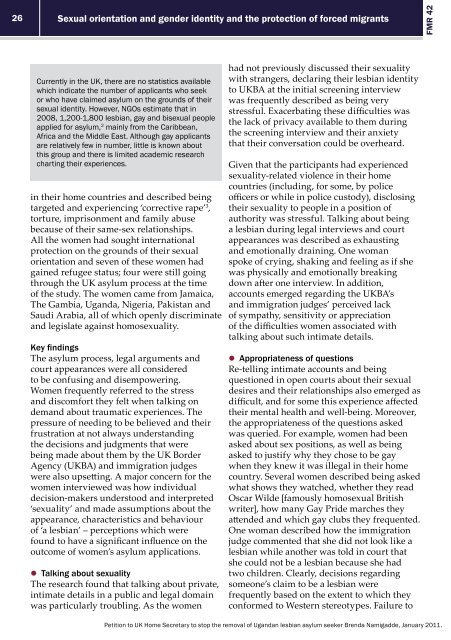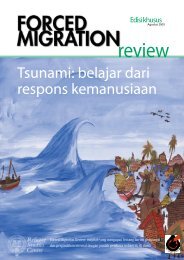FMR 42 full issue pdf - Forced Migration Review
FMR 42 full issue pdf - Forced Migration Review
FMR 42 full issue pdf - Forced Migration Review
Create successful ePaper yourself
Turn your PDF publications into a flip-book with our unique Google optimized e-Paper software.
26 Sexual orientation and gender identity and the protection of forced migrants<br />
<strong>FMR</strong> <strong>42</strong><br />
Currently in the UK, there are no statistics available<br />
which indicate the number of applicants who seek<br />
or who have claimed asylum on the grounds of their<br />
sexual identity. However, NGOs estimate that in<br />
2008, 1,200-1,800 lesbian, gay and bisexual people<br />
applied for asylum, 2 mainly from the Caribbean,<br />
Africa and the Middle East. Although gay applicants<br />
are relatively few in number, little is known about<br />
this group and there is limited academic research<br />
charting their experiences.<br />
in their home countries and described being<br />
targeted and experiencing ‘corrective rape’ 3 ,<br />
torture, imprisonment and family abuse<br />
because of their same-sex relationships.<br />
All the women had sought international<br />
protection on the grounds of their sexual<br />
orientation and seven of these women had<br />
gained refugee status; four were still going<br />
through the UK asylum process at the time<br />
of the study. The women came from Jamaica,<br />
The Gambia, Uganda, Nigeria, Pakistan and<br />
Saudi Arabia, all of which openly discriminate<br />
and legislate against homosexuality.<br />
Key findings<br />
The asylum process, legal arguments and<br />
court appearances were all considered<br />
to be confusing and disempowering.<br />
Women frequently referred to the stress<br />
and discomfort they felt when talking on<br />
demand about traumatic experiences. The<br />
pressure of needing to be believed and their<br />
frustration at not always understanding<br />
the decisions and judgments that were<br />
being made about them by the UK Border<br />
Agency (UKBA) and immigration judges<br />
were also upsetting. A major concern for the<br />
women interviewed was how individual<br />
decision-makers understood and interpreted<br />
‘sexuality’ and made assumptions about the<br />
appearance, characteristics and behaviour<br />
of ‘a lesbian’ – perceptions which were<br />
found to have a significant influence on the<br />
outcome of women’s asylum applications.<br />
• z Talking about sexuality<br />
The research found that talking about private,<br />
intimate details in a public and legal domain<br />
was particularly troubling. As the women<br />
had not previously discussed their sexuality<br />
with strangers, declaring their lesbian identity<br />
to UKBA at the initial screening interview<br />
was frequently described as being very<br />
stressful. Exacerbating these difficulties was<br />
the lack of privacy available to them during<br />
the screening interview and their anxiety<br />
that their conversation could be overheard.<br />
Given that the participants had experienced<br />
sexuality-related violence in their home<br />
countries (including, for some, by police<br />
officers or while in police custody), disclosing<br />
their sexuality to people in a position of<br />
authority was stressful. Talking about being<br />
a lesbian during legal interviews and court<br />
appearances was described as exhausting<br />
and emotionally draining. One woman<br />
spoke of crying, shaking and feeling as if she<br />
was physically and emotionally breaking<br />
down after one interview. In addition,<br />
accounts emerged regarding the UKBA’s<br />
and immigration judges’ perceived lack<br />
of sympathy, sensitivity or appreciation<br />
of the difficulties women associated with<br />
talking about such intimate details.<br />
• z Appropriateness of questions<br />
Re-telling intimate accounts and being<br />
questioned in open courts about their sexual<br />
desires and their relationships also emerged as<br />
difficult, and for some this experience affected<br />
their mental health and well-being. Moreover,<br />
the appropriateness of the questions asked<br />
was queried. For example, women had been<br />
asked about sex positions, as well as being<br />
asked to justify why they chose to be gay<br />
when they knew it was illegal in their home<br />
country. Several women described being asked<br />
what shows they watched, whether they read<br />
Oscar Wilde [famously homosexual British<br />
writer], how many Gay Pride marches they<br />
attended and which gay clubs they frequented.<br />
One woman described how the immigration<br />
judge commented that she did not look like a<br />
lesbian while another was told in court that<br />
she could not be a lesbian because she had<br />
two children. Clearly, decisions regarding<br />
someone’s claim to be a lesbian were<br />
frequently based on the extent to which they<br />
conformed to Western stereotypes. Failure to<br />
Petition to UK Home Secretary to stop the removal of Ugandan lesbian asylum seeker Brenda Namigadde, January 2011.




